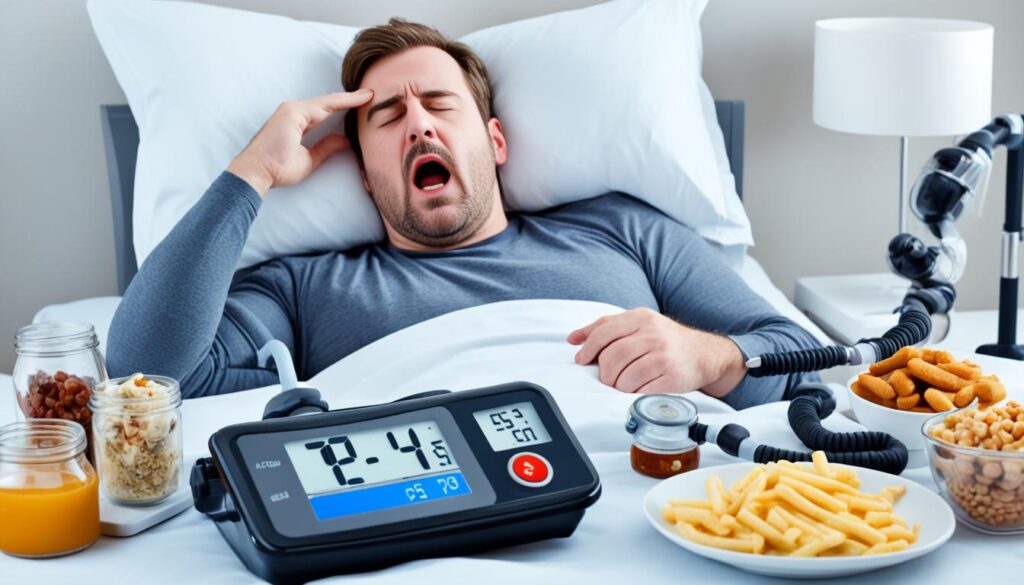Recently, I’ve looked into dealing with sleep apnea. It seems there’s a close link between being too heavy and sleep apnea. Up to 90% of people who have sleep apnea are also overweight or obese.
Losing some weight can really help with sleep apnea. Dropping 5-10% of your body weight might even make sleep apnea go away or get a lot better. Let’s talk about how losing weight affects sleep apnea and the benefits it brings for your sleep.
Understanding the Link Between Weight and Sleep Apnea
Weight is key in sleep apnea. Many Americans are affected because of this. We will talk about how weight and sleep trouble are connected.
What is Obstructive Sleep Apnea (OSA)?
OSA happens when you stop breathing during sleep. It’s common, affecting up to 38% of adults. Men get OSA more than women. It makes you tired in the day and causes other problems.
How Excess Weight Contributes to Sleep Apnea
Being overweight or obese increases the risk of OSA. 41% of OSA cases in adults come from this. For severe OSA, 58% are due to obesity. So, as you get heavier, your chance of getting OSA goes up.

The Role of Pharyngeal Fat in Airway Obstruction
Neck and throat weight can block your airway. This can cause the airway to close when you sleep, stopping you from breathing. If you gain 10% in weight, your OSA risk goes up a lot. But losing weight can make OSA symptoms better.
We learn a lot by understanding how weight and OSA are linked. It shows us why staying at a healthy weight is so important. Working on your weight can really help with your sleep and health.
The Vicious Cycle: Sleep Apnea and Weight Gain
Sleep apnea and weight gain work together in a bad way. It’s tough to stop this cycle. Bad sleep makes you want fatty foods. This is because sleep apnea affects your hunger hormones.

People with sleep apnea tend to put on more weight than others. One study showed they gained around 16 pounds before being diagnosed. That’s way more than those who sleep well.
Losing weight can really help with sleep apnea. But it’s hard when you’re always tired. Sleep apnea causes daytime tiredness. This makes you move less and gain more weight. It’s a never-ending loop.
- Sleep apnea disrupts sleep quality
- Poor sleep increases hunger hormones
- Fatigue leads to less physical activity
- Weight gain worsens sleep apnea symptoms
Stopping this cycle is crucial for sleep apnea and weight issues. Gaining better health in one area can help the other. Doctors often suggest losing weight to fight sleep apnea. It’s hard, but knowing this helps start a path to feeling better and sleeping well.
Health Risks Associated with Sleep Apnea and Obesity
Sleep apnea and obesity are a dangerous mix, leading to big health problems. I looked into how they’re connected and found out they affect our body in many ways. They mess with our heart, how we burn food for energy, and our breathing.
Cardiovascular Complications
Sleep apnea messes up our breathing while we sleep. This causes our body stress, making our blood pressure go up and our hearts beat faster. If this happens a lot, it could cause:
- Hypertension
- Atrial fibrillation
- Heart failure
- Stroke
- Coronary heart disease
Metabolic Disorders
Having both sleep apnea and being very overweight can hurt how our bodies turn food into energy. It’s tied to:
- Type 2 diabetes
- Metabolic syndrome
- Insulin resistance
People with these problems need to be serious about changing how they live. This can really help their health get better.
Respiratory Issues
People who are very overweight and have sleep apnea are at risk for obesity hypoventilation syndrome (OHS). They may not get enough oxygen and have too much carbon dioxide in their blood. This can make it hard to breathe.
- Decreased oxygen levels
- Increased carbon dioxide in blood
- Breathing difficulties
To fight these health dangers, it’s important to lose weight and get treatment for sleep apnea. It won’t be easy, but it can really help your health a lot.
Will Weight Loss Help Sleep Apnea?
Yes, weight loss helps a lot with sleep apnea. Many people have gotten better sleep by losing weight. Studies say just 5-10% less body weight can cut sleep apnea symptoms a lot. This is super good news for the 22 million Americans with sleep apnea.
In a new study, people with sleep apnea lost 10% of their weight in six months. Their sleep apnea got 31% better! This shows how important losing weight, especially tongue fat, is.
But losing weight for sleep apnea is about more than just the scale. It’s really about getting healthier. Besides helping with sleep apnea, weight loss can tackle issues like diabetes and heart problems. It can also make you feel more energetic and happy. So, to answer the big question – yes, weight loss is a key to better sleep and health.
